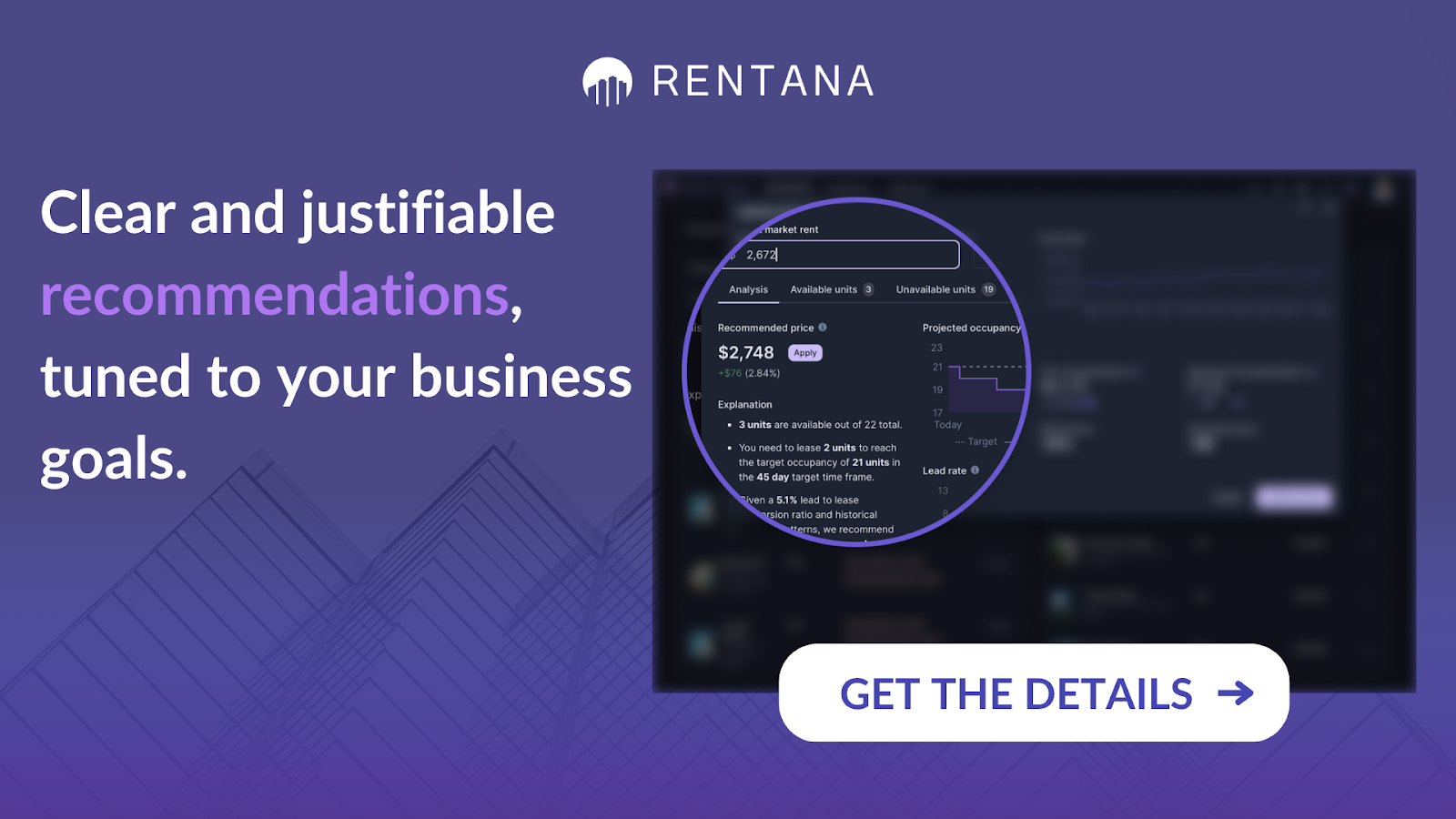




The need is here.
The rental market is influenced by many factors, such as economic conditions, demographic shifts, technology, and more. Property managers and multifamily owners constantly seek innovative tools and strategies to outperform the competition and drive profitability.
At Rentana, our AI-powered solutions redefine how property managers and revenue managers approach the rental market. With advanced algorithms and machine learning capabilities, these tools can analyze vast amounts of data to forecast rental market trends.
In this article, we’ll explore AI's impact on predicting rental market trends and how it positions multifamily property managers to achieve unparalleled success in a competitive market.

The property management sector is experiencing a significant transformation thanks to the integration of predictive analytics. This shift is propelled by the necessity to anticipate rental market trends and make more informed decisions. Predictive analytics, a branch of advanced analytics that uses current and historical facts to forecast future events, is now a crucial tool for multifamily owners and operators seeking an edge.
Rentana uses sophisticated algorithms and machine learning techniques to analyze vast amounts of data, including rental rates, occupancy levels, and public market dynamics, to predict future trends in the rental market. This level of insight is invaluable for property managers aiming to optimize their strategies in line with anticipated changes.
One of predictive analytics' most compelling advantages is its ability to provide optimal rent pricing recommendations. In an erratic market, setting the right price can be the difference between high vacancy rates and optimized revenue. Rentana's platform offers a solution by dynamically adjusting rent prices based on real-time public market data and forecasts.
Unlike traditional market analysis methods that rely on historical data, AI-powered tools can analyze and interpret real-time market dynamics. Property managers can stay ahead of current trends, adjusting their strategies to support occupancy rates and rental income. With Rentana, for example, multifamily owners and operators have access to up-to-minute market insights, enabling them to make informed decisions swiftly.
AI doesn't just offer a snapshot of the current market; it also predicts future trends with remarkable accuracy. Analyzing vast datasets like economic indicators, demographic shifts, and social media trends enables AI to forecast future rental demands. This predictive power allows property managers to adjust their pricing strategies in advance, ensuring they're always one step ahead of the competition.
Predicting rental market trends with AI also significantly streamlines operations. Automating lease renewals and rent adjustments lets property managers focus on more strategic initiatives, such as tenant engagement and property improvements. Rentana exemplifies this by offering tools that automate the reporting process, making it easier than ever for managers to collaborate and make data-driven decisions.
Finally, using AI to predict rental market trends provides a distinctive competitive advantage. Quickly adapting to changing conditions and anticipating future movements in a crowded market sets multifamily owners and operators apart. Rentana's AI-powered platform ensures its users are keeping pace and setting the trend, offering unmatched operational insights that lead to sustained success.
Historically, property managers have relied on traditional market analysis techniques to forecast rental market trends. These methods typically include manual data collection from various sources, such as local government housing reports, classified ads, and public rental listings. Analysts then interpret this data, often relying heavily on experience and intuition to predict market movements.
However, this traditional approach has several limitations, including that:
AI offers several compelling advantages over traditional techniques, like identifying patterns and trends in the data that may be invisible to the human eye, allowing for more accurate predictions. Moreover, AI-driven analysis can be conducted significantly faster, enabling property managers to react swiftly to market changes. This agility is paramount in a competitive rental landscape where timing can significantly influence revenue potential.

AI excels in processing vast amounts of data, identifying patterns, and predicting rental market trends. This capability enables property managers to make informed decisions swiftly, a necessity in today's dynamic market.
While AI provides a robust foundation for strategic planning, property managers' nuanced understanding and interpersonal skills remain irreplaceable. From negotiating lease renewals to addressing tenants' unique needs, the human touch fosters relationships and builds trust.
Rentana facilitates a seamless integration of AI and human expertise. The platform’s user-friendly interface ensures property managers can easily interpret and apply AI-generated insights in their operations. Furthermore, Rentana encourages a proactive approach to property management, where AI's predictive analytics and the property manager's decision-making prowess leads to more strategic rent pricing, efficient lease management, and, ultimately, enhanced revenue growth.
Staying ahead of rental market trends is crucial for generating revenue and ensuring operational efficiency.
Rentana’s AI-powered platform represents a paradigm shift in how property managers approach this challenge. We offer a predictive glance into future market dynamics and equip property managers like you with the tools to price units accurately, manage lease renewals effectively, and gain invaluable operational insights.
In a nutshell, Rentana is not just a tool but a partner for those looking to navigate the complexities of the rental market with confidence and strategic foresight.
Read also:
Artificial Intelligence (AI) in the context of rental market prediction refers to using advanced algorithms and machine learning techniques to analyze large volumes of data related to the rental market. This technology can identify patterns, predict future market trends, and offer actionable insights. AI systems can process and analyze data at a scale and speed beyond human capability, providing more accurate and timely predictions.
AI predicts rental market trends by aggregating and analyzing vast amounts of data, including historical rental prices, vacancy rates, economic indicators, demographic shifts, and real-time market conditions. Applying machine learning algorithms helps you identify patterns and correlations within the data, forecasting future trends and market movements. This predictive capability is constantly refined as the AI system learns from new data, improving its accuracy over time.
Property managers can gain several significant benefits from AI predictions, including:
AI-driven rental market forecasts utilize a wide range of data sources, including but not limited to:
Integrating these diverse data sources allows AI systems to view the rental market and its potential future directions comprehensively.
The accuracy of AI rental market predictions can vary based on the amount and quality of data inputted, the specific algorithms used, and the dynamic nature of the real estate market. However, AI systems are generally highly effective at identifying trends and making forecasts, especially compared to traditional analytical methods. Continuous learning mechanisms within AI systems mean their accuracy improves over time as they process more data and refine their algorithms.
Yes, AI significantly contributes to setting optimal rental prices. By analyzing public market trends, demand patterns, and the characteristics of specific properties, AI-powered platforms like Rentana can recommend rental prices that generate revenue. This ensures property managers can attract tenants while optimizing their income potential, a key advantage in any rental strategy.